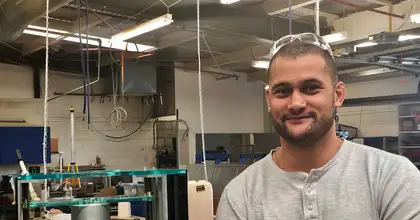
Rangi Otene completed his Bachelor of Engineering, majoring in mechatronics at the end of 2019.
"Growing up, I didn’t feel like I would end up being a university student. Teachers, and even friends, would put me down by making comments like 'you’re not smart enough for that' and 'you’re just a dumb Māori/Islander'. Hearing these, I developed low expectations for myself and felt depressed about my ethnicity and not being smart enough to go to university."
Rangi says these comments can have disheartening effects on Māori and Pacific students, stunting their futures and discouraging them from realising their dreams and aspirations.
After completing NCEA level 3 in high school on the North Shore of Auckland, Rangi took up two trades, becoming an electrician and a high-voltage switch fitter. Fully qualified at the age of 21, he headed overseas to work in mining, but after a few years he felt like he wasn’t living up to his potential.
"My head was saying: use what God has given you, while you still have a chance."
He researched several universities in New Zealand, and chose to enrol at Massey University’s School of Engineering and Advanced Technology (now known as the School of Food Technology and Natural Sciences) in Albany, whose engineering qualification matched his practical nature.
"Going back to study, after a number of years being in the workforce, wasn’t easy. I had to start from square one again, re-learning the fundamentals. Because of my age I felt I didn’t have time to waste – I thought to myself, 'forget the pride and stop trying to look good in front of people, if you don’t know what you’re doing, ask for help'. That attitude started right from the beginning of my studies. Lectures like as Dr Sam Tuttle, Dr Frazer Noble and Dr Khalid Arif, were great – they broke down their lessons into small bites that I understood, and spent time helping me when I needed it. I had to teach myself a sense of humility, to ask questions. That may seem easy to other people, but to me it was hard."
Rangi admits that feeling whakamā (embarrassed) is a big issue for Māori and Pacific students, but he says he has learned to ask for help from other students, and credits his grades to class mates who pushed him to excel. Engineering on the Albany campus offered a real whānau atmosphere.
"Sometimes I stayed here till one or two in the morning because I didn't want to leave. I was always wanting to learn something new and this place just felt like another home."
He says it was the Massey staff who helped him continue his studies when his whānau went through dark times.
"It became a real fight to carry on and staff members, such as Sean Rasmussen and Blair Dixon, listened to my needs and offered quiet places to study when times were hard. For me that came across as a manakitanga [kindness]."
Rangi quickly became passionate about his mechatronics major, which combined mechanical engineering, computing engineering and electrical engineering. He felt he grew with every semester. Now, he dreams of getting into renewable energy.
"Growing up I always remember hearing about people struggling to pay for water and power. Now I’m thinking, what if we could give low income families the power to control these two resources themselves? We have the technology now to make our homes self-sufficient and that’s a career path I’d like to pursue."
He hopes that his individual project, in manipulating high electric fields for electro-spinning purposes, will feed into the development of renewable energy technology.